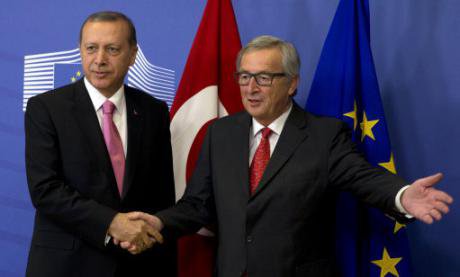
Turkish President Erdogan meets Jean-Claude Juncker. PAimages/Virginia Mayo. All rights reserved.
“Through the storm we reach the shore” sings Bono in U2's hit song “With or Without You”. That lyric definitely reflects the tone of Turkey-EU relations during the first 5 months of 2016.
Turkey-EU relations have been “re-energized” after the dubious fefugee swap deal and enhanced migration management cooperation arrangements in the first half of 2016. During the same period, visa liberalization dialogue between Turkey and the EU has accelerated, high level dialogues on energy, economy and politics have been launched between the two sides and once again, Turkey started to appear in the family photos of the major EU Summits. In other words, the Turkey-EU ship finally reached the shore after a long, slow sail.
The failed coup d’etat attempt in Turkey, with a total of 246 dead (including 145 civilians) and 1536 wounded, traumatized every layer of Turkish society and cast another heavy storm on the boat. The following day, the reintroduction of the death penalty became an item of the political debate in Turkey.
The EU side was swift in its response. After her bilateral meeting with US Secretary of State John Kerry on 18 July 2016 in Brussels, High Representative of the EU for Foreign Affairs and Security Policy Federica Mogherini stated that, “Turkey is an important part of the Council of Europe and is bound by the European Convention on Human Rights” and “No country can become an EU state if it introduces the death penalty". Very clear. However, the devastating effects of a coup d’etat in Turkey to Turkey-EU relations is not a new story.
Just after the coup d’etat in Turkey in 1980, dialogue between the EU and Turkey was suspended. Turkey’s accession efforts still suffer from that “period of stagnation”. As a matter of fact, that period is blamed for the punitive visa restrictions applied against Turkey by individual European states at that time. After the establishment of the civilian government in 1983, relations ameliorated.
On the other hand, the Turkey-EU Accession Negation Framework has always been one of the most important anchors for Turkey in terms of inspiring higher democratic standards, protection of human rights and prosperity. “With or without you” has always been a melody in the ears. In spite of major contrasts, challenges and tensions; the boat kept seeking for a shore.
This tone is felt broadly among the Turkish public. According to the results of a study by the Turkish Economic Development Foundation (IKV) on 9 May 2016, 75.5% of eligible voters in Turkey are in favour of EU membership. Bringing back the death penalty would be a huge step backwards for democracy, social cohesion and human rights in Turkey.
In addition, the process of removing the death penalty is itself a critical example of the significant progress that was made in terms of judicial reform and enhancing human rights in alignment with the relevant EU acquis, and shows the ambition of the two sides in this relationship.
Anatomy of the death penalty abolition on “Turkey-EU relations pendulum”
As EU membership candidate country, Turkey is obliged to harmonise its laws with the Lisbon Treaty and EU Charter of Fundamental Rights, respect the well-known Copenhagen criteria and meet the benchmarks of the negotiation chapters in respect to human rights.
Also, as a founding member of the Council of Europe, Turkey is among the early signatories of the European Convention on Human Rights (ECHR). To that extent, with revolutionary constitutional amendments occurring in 2001, 2004 and 2010; one-third of the Turkish Constitution has been restructured to sail through the EU harbour. With eight different “harmonization packages”, acceleration was gained to fulfill political criteria and reach the EU standards in terms of fundamental rights and freedoms. Abolition of the death penalty has been arguably the most noticeable and most symbolic result of this process.
Within the scope of the harmonization packages, the first real move took place when third harmonization package entered into force on 9 August 2002 in Turkey. The third package ensured that with the amendments to the national legislation in line with Protocol 6 to the ECHR, the death penalty was no longer to be enforced except in times of war, imminent threat of war and terrorism.
The sixth harmonization package which entered into force on 19 July 2003 ensured further alignment and left crimes of terror out of the scope of the exceptions to the abolition of death penalty. The eighth harmonization package to the EU acquis ensured the amendment of relevant laws in line with constitutional amendments and, after an intense and ambitious legislative process in Turkey, the death penalty was finally abolished in all circumstances. Also it should be underlined that, even though the death penalty had existed within the judicial framework of Turkey before 2004; it hasn’t been carried out since 1984.
During the same judicial reform period in the early 2000s, amendment of the 90th article of the Turkish Constitution which establishes the relationship between national legislation and international agreements is considered as another major step forward. The following sentence was added after the amendment of 90th article: “In the case of a conflict between international agreements in the area of fundamental rights and freedoms and domestic laws due to differences in provisions on the same matter, the provisions of international agreements shall prevail”.
The reintroduction of the death penalty would endanger the hard work that has been done in Turkey-EU relations. Just as importantly, it would endanger Turkey’s international obligations, and its democratic gains. Through the storms of the refugee crisis, global terror, Brexit, increasing xenophobia and populism in the world, this is not a right time for either Turkey or the EU to say “without you”.
Read more
Get our weekly email



Comments
We encourage anyone to comment, please consult the oD commenting guidelines if you have any questions.